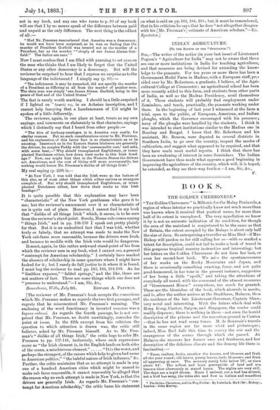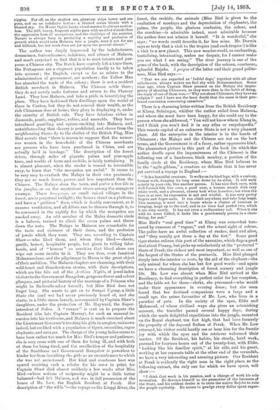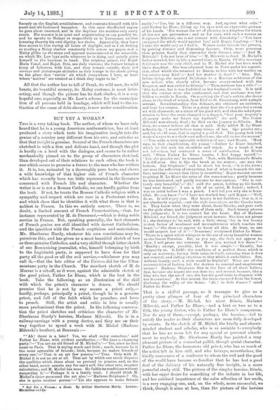BOOKS.
THE GOLDEN CHERSONESE.*
"Tits Golden Chersonese " is Miltouic for the Malay Peninsula, a region of whose interior we practically know not much more than
was known when it received that poetical name, for more than half of its extent is unexplored. The very appellation we know it by is not an accurate indication of its condition, for though the area of the mainland is conjectured to be the same as that of Britain, the extent occupied by the Malaya is about only half the size of Java. So enterprising a traveller as Miss Bird—if Mrs. Bishop will pardon us for still calling her so—with so marked a talent for description, could not fail to make a book of travel in this gorgeous tropical country instructive and interesting; but her letters on the Golden Chersonese do not form her best, or even her second-best book. We mi,s the spontaneousness of her works on the Rocky Mountains and Japan, and there is occasionally something exacting, fussy, and not quite good-humoured, in her tone in the present instance, suggestive of her being a little "spoilt," and taking the attentions of everybody all round, with the command of the utmost resources of "Government House" everywhere, too much for granted. These are the blemishes of the book, which abounds in merits, and is, after the author arrives at the Stadthaus, Malacca, then the residence of the late Lieutenant-Governor, Captain Shaw, very novel and interesting. With the letters which deal with Hong Kong, Canton, Saigon, and Singapore, the reader could readily dispense ; there is nothing in them—not even the horrid description of the prisons and the execution-ground in Canton —that he has not read many times. M. de Beauvoir's travels in the same region are far more vivid and picturesque ; indeed, Miss Bird fails this time to convey the stir and the strangeness of the scenes through which she passed. At Malacca she recovers her former ease and freshness, and her description of the delicious climate and the dreamy life there is fascinating :—
" Trees, trailers, fruits, smother the houses, and blossom and fruit all the year round ; old leaves, young leaves, bulls, blossoms. and fruit all appearing at once. Tho mercury rarely falls below 79', or rises above 84'. The softest and least perceptible of land and sea breezes blow alternately at stated hours. The nights are very still. The days are a tepid dream. Since I arrived, not a leaf has stirred, not a bird has sang, the tides ebb and flow iu listless and soundless • The Golden Cherannete, and the Way Thither. By Isabella L. Bird (Mrs. Bisbop) . London : John Murray. ripples. Far off, on the shallow sea, phantom ships hover and are gone, and on an indefinite horizo i a blurred ocean blends with a blurred sky. On Meant Ophir, heavy cloud-masses lie always motion- less. The still, heavy, fragrant nights pass with no other sounds than the aggressive hum of mosquitoes, and the challenge of the sentries. Nature is always busy in producing a rapidity and profusion of growth which would turn Malacca into a jungle, were it not for axe and billhook, but her work does not jar upon the general silence."
The author was deeply impressed by the indefiniteness, dreaminess, featnrelessness, indolence, and silence of Malacca, and much surprise 1 to find that it is to most intents and pur- poses a Chinese city. The Dutch have scarcely left a trace there, the Portuguese are a stagnant population hardly to be taken into account ; the English, except so far as relates to the administration of government, are nowhere ; the Yellow Man has absorbed the trade of the colony ; there is not a resident British merchant in Malacca. The Chinese settle there ; they do not merely make fortunes and return to the Flowery Land. They love Malacca, and take a pride in beautifying the place. They have fashioned their dwellings upon the model of those in Canton, but they do not conceal their wealth, as the rich Chinaman does at home; they glory in displaying it, under the security of British rule. They have fabulous riches in diamonds, pearls, sapphires, rubies, and emeralds. They have introduced gambling and opium-smoking into Malacca, and, notwithstanding that slavery is prohibited, and slaves from the neighbouring States fly to the shelter of the British Flag, Miss Bird asserts that " there is reason to suppose that the numer- ous women in the households of the Chinese merchants are persons who have been purchased in China, and are actually held in bondage." The description of the forest drives, through miles of gigantic palms and pine-apple trees, and worlds of ferns and orchids, is fairly tantalising. It is almost pleasant, when the reader is roused to irresistible envy, to learn that "the mosquitos are awful." It seems to be very easy to overlook the Malays in their own peninsula ; they are so much fewer, poorer, and less important than the Chinese. The Malaya shun the town, and prefer a free life in
the jungles. or on the mysterious rivers among the mangrove swamps. These kampougs, or small raised villages in the
forest, are in perpetual twilight ; the houses stand on a platform, and have a " gridiron " floor, which is doubly convenient, as it ensures ventilation, and all debris can be thrown through it, to be consumed in the nightly fire by which the mosquitos are smoked away. An odd member of the Malay domestic circle is a baboon, trained to climb the cocoa palms and throw down the nuts. The Malays in Malacca are remarkable for the taste and richness of their dress, and the profusion of jewels which they wear. They are, according to Captain Shaw s— who liked them, and whom they liked — chaste, gentle, honest, hospitable people, but given to telling false- hoods, and of " honour" so sensitive that blood alone can wipe out some insults to it. They are firm, even fanatical Mohammedans, and the pilgrimage to Mecca is the great object of their ambition. The Malacca chapters are charming, with their
wild-beast and thunderstorm stories, with their descriptions, which are like bits out of the Arabian. Nights, of jewel-laden
visitors to the Government Bungalow, gorgeous flower and colour glimpses, and pictorial history of the marriage of a Princess who might be Badroulboudoor herse7f ; but Miss Bird does not linger long. She wants to get on to Sungei Ugong, a little State she (and we) hai never previously heard of, and she starts, in a little steam launch, accompanied by Captain Shaw's daughters, under the protection of Mr. Hayward, the Super- intendent of Police. A " runner" is rent on to prepare -the Resident (the late Captain Murray), for such an unusual in- cursion into his territories, and Malacca is much exercised about the Lieutenant-Governor's trusting his girls in aregion,unknown
indeed, but credited with a population of tigers, crocodiles, rogue elephants, and savages. The charge of the young ladies seems to have been rather too much for Mis 3 Bird's temper and patience;
she is very cross with one of them for being ill, and with both of them for being tired, and the recollection of the hospitality of the Stadthaus an-1 Government Bungalow is powerless to binder her from describing the girls as an encumbrance to which she was not accustomed. Her kind and courteous host was spared receiving such a rebuke for his error in print, for Captain Shaw died almost suddenly a few weeks after Miss Bird—whose notions of reciprocity might be a little better balanced—had left Malacca, and was in full possession of the house of Mr. Low, the English Resident at Perak. Her description of " the wills "—the voyage on the Linggi River, the forest, the orchids, the animals (Miss Bird is given to. the- exaltation of monkeys and the depreciation of elephants), the palms, the people, the glorious confusion, the colour, and the sunshine—is admirable indeed, most admirable because the author does not admire it herself. "It is wonderful," she says; "no words could describe it, far less mine. Mr. Darwin says so truly that a visit to the tropics (and such tropics Dislike a visit to a new planet. This new wonder-world, so enchanting, tantalising, intoxicating, makes me despair, for I cannot make-
you see what I am seeing." The river journey is one of ilia gems of the book, with the description of the solemn, courteous,. splendid Rajahs. .1 propos of the latter and their grand pilite- ness, Miss Bird says :— " That we are regarded as Infidel dogs,' together with all other. unbelievers, always makes me feel shy with Mohammedans. Some- time ago, when Captain Shaw pressed on the Malays the impro- priety of shooting Chinamen, as they were then in the habit of doing, the reply of one of them was,—' Why not shoot Chinamen, they have DO- religion ?' and I have not the least doubt that the same is their pro found conviction concerning ourselves."
There is a charming letter written from the British Residency at Kiang, Selnfingor, whither the author sailed from Malacca,. and where she must have been happy, for she could say to the- person whom she addressed, " Yon will not know where Kiang is, and I think you won't find it in any atlas or encyclopmdiat This remote capital of an unknown State is not a very pleasant place. All the enterprise in the interior is in the hands of Chinamen ; the Malays and the Chinese are not on the best terms, and the Government is of a fussy, rather oppressive kind. The pleasantest picture in this part of the book (in which the author dwells upon the impassiveness of the Chinese) is the- following one of a handsome, black monkey, a portion of the family circle at the Residency, whom Miss Bird believes to be the " agile gibbon," a creature so delicate that it has never yet survived a voyage to England :-
" It is a beautiful creature. It walks on its hind legs, with a curious,. human walk, hanging its long arms down by its sides. It will walk quietly by your side, like another person. it has nice dark eyes, with. well-formed lids like ours, a good nose, a human mouth with very- white teeth, and a pleasant, cheery look when it smiles; but when the face is at rest, its expression is sad and wistful. It has very pretty fingers and finger-nails. It can climb anywhere and take long leaps. This morning, it went into a house where a cluster of bananas is• hanging, leapt up to the roof, and in to time had peeled two, which it ate very neatly. It has not even a rudimentary tail. When it sits with its arms folded, it looks like a gentlemanly person in a close- fitting, fur suit."
Miss Bird's "real good time" at Kiang was somewhat tem- pered by rumours of "rogues," and the actual sight of cobras.. The police have an awful collection of snakes, dead and alive,.
and " they usually got three a day at the fort." Some good tiger stories enliven this part of the narrative, which flags a good deal about Pinang, but picks up satisfactorily at the " protected "• State of Perak, the richest and most important, as well as one of the largest of the States of the peninsula. Miss Bird plunged
deeply into the interior ea route, by the aid of the elephant—the only animal for whom she has but few good words—and again we have a charming description of forest scenery and jungle" life. Mr. Low was absent when Miss Bird arrived at the- Residency, to find everything in perfect order for her reception, and the table set for three—clerks, she presumed—who would, make their appearance in evening dress ; but she soon• found that her destined companions were a large and a. small ape, the prime favourites of Mr. Low, who lives in a paradise of pets. In the society of the apes, Eblis and Mahmoud, of whose civilised ways she gives an astonishing- account, the traveller passed several happy days, during which she made delightful expeditions into the jungle, mounted on the Royal elephant, ten feet high, that had been formerly- the property of the deposed Sultan of Perak. When Mr. Low- returned, his visitor could hardly see or hear him for the frantic. joy with which the apes and the retriever welcomed their master. Of the Resident, his habits, his steady, hard work,.
pursued for fourteen hours out of the twenty-four, with Eblis, " looking like his familiar spirit," at his side, and his guest,. working at her separate table at the other end of the verandah,.
we have a very interesting and amusing picture. Our Resident at Perak is evidently the right man in the right place, as the.
following extract, the only one for which we have space, will show :—
" I think that work is his passion, and a change of work his sole, recreation. He devotes himself to the promotion of the interests of the State, and his evident desire is to train the native Rajahs to rule the people equitably. He seems to grudge every dollar spent super- fiaously on the English establishment, and contents himself with this small and old-fashioned bungalow. In this once disaffected region he goes aboat unarmed, and in the daytime the sentries only carry cane's. His manner is as quiet and unpretending as can possibly be, and he speaks to Malays as respectfully as to Europeans, ',either lowering thereby his own dignity, nor theirs. Apparently, they have free access to him during all hours of daylight, and as I it writing or reading a Malay shadow constantly falls across my paper, and a Malay glides up the steps and appears unannounced in the verandah, on which Mr. Low lays aside whatever he is doing, and quietly gives himself to the business in hand. The reigning prince, the Rajah Mnda Yusuf. and Rajah Dris, are daily visitors; the former brings a troop of followers with him, and they remain outside, their red sarongs and picturesque attitudes as they lounge in the shade giving to the place that native' air which everywhere I love, at least 'where 'natives' are treated as I think they ought to be."
All that the author has to tell of Perak, its wild men, its wild- -beasts, its beautiful scenery, its Malay customs, is most inter- esting, and though the picture has its dark shades, it is a very hopeful one, especially as Mr. Low's scheme for the emancipa- tion of all persons held in bondage, which will lead to the ex- tinction of the curse of debt-slavery, is now under consideration.




































 Previous page
Previous page